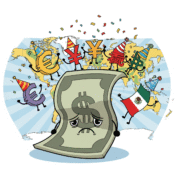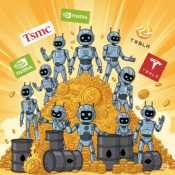Is Trump the Gorbachev of the American Empire?
In the grand theater of geopolitics, where empires rise and fall like poorly constructed IKEA furniture, two figures stand out as unlikely undertakers of superpower dominance: Donald J. Trump and Mikhail Gorbachev. One, a brash real estate mogul turned reality TV star turned commander-in-chief. The other, a Soviet reformer with a birthmark and a penchant for perestroika. And yet, as history unfolds, the parallels between these two men are as striking as Trump’s orange hue or Gorbachev’s love for capitalist pizza commercials.
Let’s start with the obvious: both men presided over the unraveling of their respective empires. Gorbachev, the last leader of the Soviet Union, watched as the Red Empire crumbled under the weight of its own inefficiency, corruption, and the relentless pressure of Reagan’s America. Trump, the self-proclaimed “deal-maker,” now finds himself in a similar position, admitting defeat in Ukraine and signaling a retreat from America’s global dominance. The parallels are as delicious as a Big Mac in Red Square.
Gorbachev’s legacy is one of surrender—though some might call it “enlightened pragmatism.” He pulled Soviet troops out of Afghanistan, ended the Cold War, and allowed the Eastern Bloc to crumble without a shot fired. For this, he’s hailed as a hero in the West and a traitor in Russia. Trump, too, seems poised to go down in history as the president who surrendered. His reluctance to engage in foreign conflicts, his cozying up to Putin, and his recent admission that Ukraine is a “loser” for America all point to a man who’s more interested in cutting losses than preserving empire.
But let’s not forget the irony here. Gorbachev was a committed communist who inadvertently paved the way for capitalism. Trump, a capitalist to his core, may well be remembered as the man who accelerated America’s decline, paving the way for a multipolar world where China and Russia call the shots. The circle of life, folks.
And then there’s the charisma—or lack thereof. Gorbachev had that folksy, grandfatherly charm, even if his policies left millions of Russians nostalgic for the good old days of bread lines and gulags. Trump, on the other hand, has the charm of a used car salesman who just sold you a lemon. Yet both men managed to captivate their audiences, whether it was Gorbachev’s earnest appeals for glasnost or Trump’s midnight Twitter rants about “fake news.”
But perhaps the most striking similarity is how both men will be remembered. Gorbachev is often seen as a tragic figure—a man who tried to reform an un-reformable system and ended up presiding over its collapse. Trump, too, may be remembered as a tragic figure—a man who promised to “Make America Great Again” but instead oversaw its retreat from global leadership.
Of course, the Trump loyalists will howl in protest. “How dare you compare the God-Emperor to a commie!” they’ll cry. But history has a funny way of cutting through the noise. In the end, both Trump and Gorbachev will be remembered as the reluctant gravediggers of empire—not with a bang, but with a whimper.
So, as we raise a glass of vodka (or a Diet Coke, if you’re so inclined), let’s toast to the men who, willingly or not, shoveled dirt on their own nations’ dominance. One brought down the Iron Curtain. The other may well lower the Stars and Stripes. And in the grand scheme of things, isn’t that just the way the cookie crumbles?



